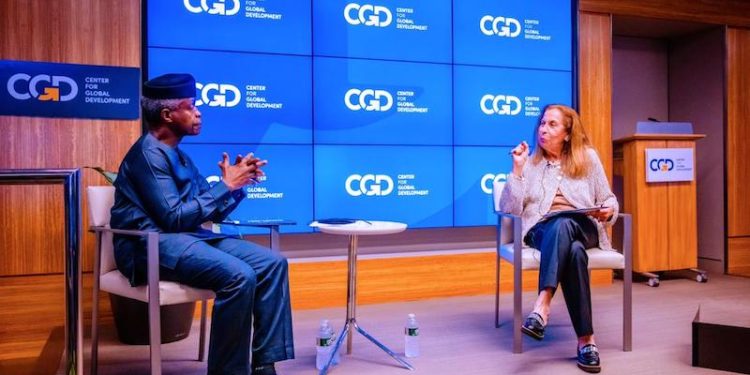Nigeria’s Vice president, Yemi Osinbajo, has proposed a debt-for-climate swap agreement to ensure that African countries–the most vulnerable to the impacts of climate change–have a just and equitable energy transition.
The Vice President revealed this concept at various events including in a talk he delivered at the Center for Global Development (CGD) on Nigeria’s energy transition, climate change, and what a just energy transition means for Africa.
Mr. Yemi Osinbajo thinks that the debt-for-climate deal, if successful, would reduce the debt burdens of Nigeria and other African countries by billions of dollars.
What Osinbajo is saying
Professor Yemi Osinbajo highlighted the fact that Europe has not been neglected in its energy crises, as the continent continues to receive support and international resources. However he said that,
“The developing world is still being held to account for its emission reductions without adequate support and investment for the energy transition. The climate crisis and our commitment to resolving it will involve significant sacrifices from all, and not just poor countries.”
“While Africa’s current unmet energy needs are huge, future demand will be even greater due to expanding populations, urbanization, and movement into the middle class. It is clear that the continent must address its energy constraints and would require external support and a good measure of policy flexibility to deliver this.”
The VP stated that To scale up energy transition, a comprehensive approach involving collaborations in the market and clean energy environmental opportunities, has to be driven by the financing of clean energy assets in growing energy markets.
He said, “in addition to conventional capital flows from public and private sources, it is essential that Africa can participate more fully in the global carbon finance market.”
“Supporting Africa to develop into a global supplier of carbon credits ranging from bio-diversity to energy-based credits will be a leap forward in aligning carbon pricing and related policy around a just transition.”
“It is very evident that a just transition is key not only in ensuring equity in climate policy but also in building market structures that incentivize climate action such as well functioning carbon markets.”
The VP drew attention to the rising debt situations of many developing countries, especially the repercussions of the pandemic and the Russia-Ukraine crisis, he stated that there is a need to bring debt-for-climate swaps into the climate finance mix.
According to Osinbajo, “the debt-for-climate swap is a type of debt swap where bilateral or multilateral debt is forgiven by creditors in exchange for a commitment by the debtor to use the outstanding debt service payments for national climate action programs.”
Speaking further, he explained that in the swap deal “the creditor country or institution agrees to forgive part of a debt if the debtor country would pay the avoided debt service payment in a local currency into an escrow or any other transparent fund and the funds must then be used for agreed climate projects in the debtor country.”
The VP’s Senior Special Assistant on Media and Publicity, Laolu Akande, revealed that Osinbajo’s proposal has received positive reviews amongst senior US government officials with some describing it as an innovative idea.
What you should know
- The debt-for-climate swap will reduce the level of indebtedness and free up fiscal resources to be invested in clean energy projects in Nigeria and other countries signed up for the program once accepted by creditor-nations,” the statement read.
- If the swap arrangement works out, Nigeria will save up N410 billion in energy transition implementation. Rate Captain had previously reported the Vice President’s remark on the cost implication of the delivery of the energy transition plan










